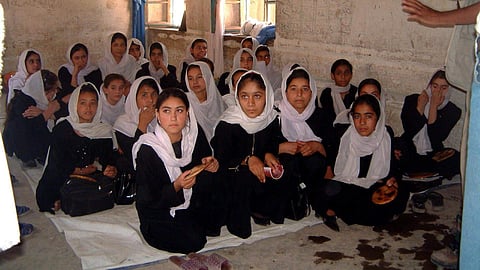

A joint report released by the United Nations Educational, Scientific & Cultural Organisation (UNESCO) and the United Nations International Children’s Relief Fund (UNICEF) warns that Afghanistan’s education system is in a severe crisis, which could derail the futures of millions of children and youth in the country.
According to the report, titled Afghanistan Education Situation Report 2025, over 2.13 million primary-aged children are currently out of school, and many who do attend fail to achieve basic literacy or numeracy skills. Shockingly, more than 90 per cent of ten-year-olds in the country cannot read a simple text.
The report also mentions a policy introduced by the Taliban regime that garnered condemnation from the global community: The ban on girls’ secondary education.
Now in its fourth year, the ban has left 2.2 million adolescent girls unable to attend classes, making Afghanistan the only country in the world where girls and women are systematically denied access to secondary and higher education.
Meanwhile, boys’ enrolment in higher education has dropped by approximately 40 per cent since 2019.
Conditions in schools further exacerbate the crisis — nearly half of all schools lack essential facilities such as clean water, sanitation, or heating, and over 1,000 schools are closed due to conflict and natural disasters.
The report emphasises alarming long-term consequences if the restrictions on girls’ education persist, warning that nearly 4 million girls could be denied secondary education by 2030.
The higher education ban on women alone may cost Afghanistan up to USD 9.6 billion in lost economic potential by 2066, which is about two-thirds of its current GDP, the report estimates.
In their report, UNESCO and UNICEF call for immediate, decisive action: the reopening of schools and universities to girls, the expansion of inclusive learning opportunities, particularly foundational education, as well as a long-term investment in programs that provide literacy, numeracy, life skills, and livelihoods.
UNESCO mentioned that it has already trained community facilitators in more than 2,600 villages, reaching over 56,000 young people, mainly girls, with learning being delivered through radio, television, online platforms and WhatsApp. Through these modes, the organisation can reach about 17 million Afghans, offering alternatives where in-person schooling is inaccessible.
